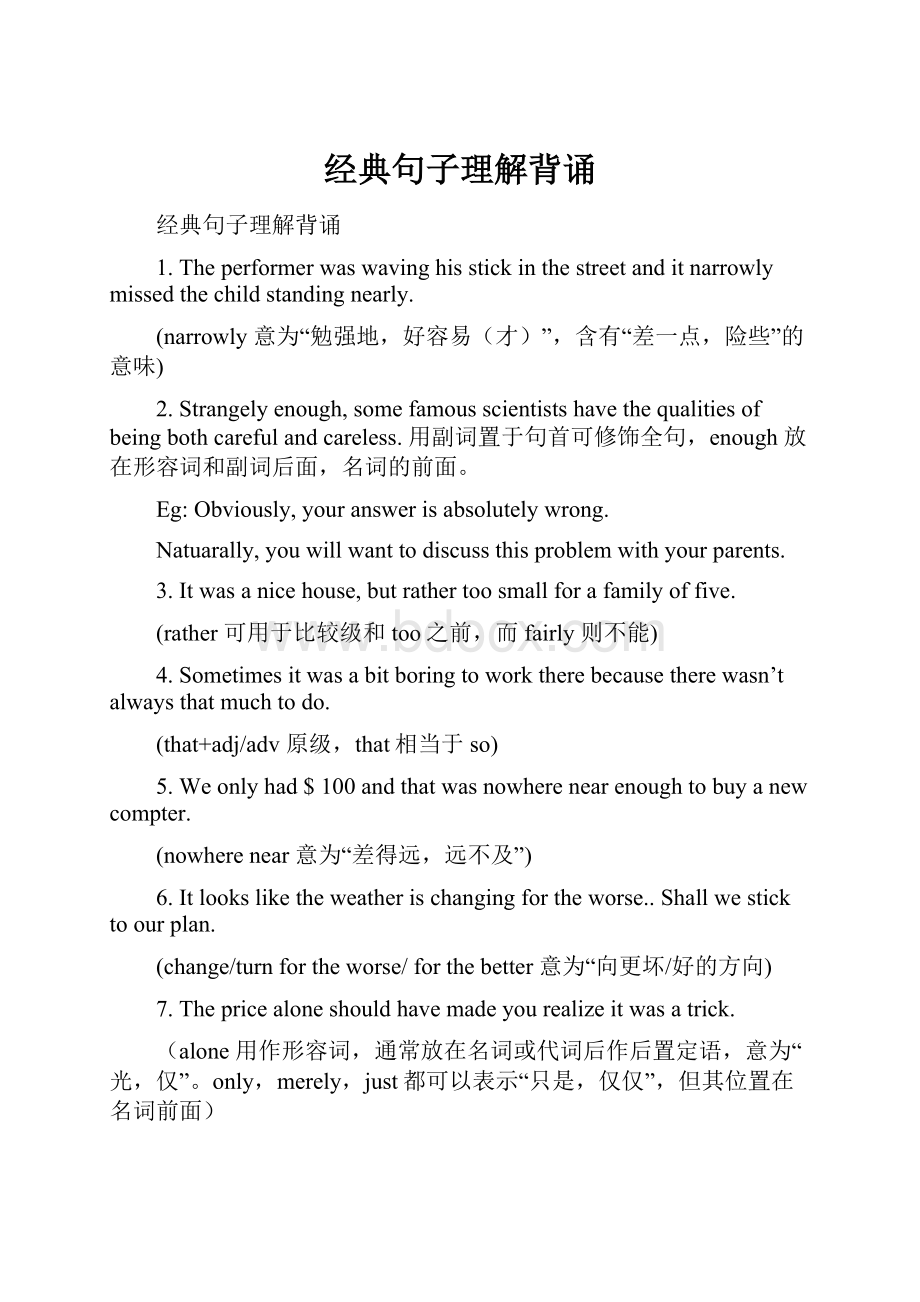经典句子理解背诵.docx
《经典句子理解背诵.docx》由会员分享,可在线阅读,更多相关《经典句子理解背诵.docx(20页珍藏版)》请在冰豆网上搜索。

经典句子理解背诵
经典句子理解背诵
1.Theperformerwaswavinghisstickinthestreetanditnarrowlymissedthechildstandingnearly.
(narrowly意为“勉强地,好容易(才)”,含有“差一点,险些”的意味)
2.Strangelyenough,somefamousscientistshavethequalitiesofbeingbothcarefulandcareless.用副词置于句首可修饰全句,enough放在形容词和副词后面,名词的前面。
Eg:
Obviously,youranswerisabsolutelywrong.
Natuarally,youwillwanttodiscussthisproblemwithyourparents.
3.Itwasanicehouse,butrathertoosmallforafamilyoffive.
(rather可用于比较级和too之前,而fairly则不能)
4.Sometimesitwasabitboringtoworktherebecausetherewasn’talwaysthatmuchtodo.
(that+adj/adv原级,that相当于so)
5.Weonlyhad$100andthatwasnowherenearenoughtobuyanewcompter.
(nowherenear意为“差得远,远不及”)
6.Itlooksliketheweatherischangingfortheworse..Shallwesticktoourplan.
(change/turnfortheworse/forthebetter意为“向更坏/好的方向)
7.Thepricealoneshouldhavemadeyourealizeitwasatrick.
(alone用作形容词,通常放在名词或代词后作后置定语,意为“光,仅”。
only,merely,just都可以表示“只是,仅仅”,但其位置在名词前面)
8.Ashort,thinman,wellpastmiddleage,visitedthemanagerandappliedfortheposition.
(well远远地,表程度,bewellworthdoing)
9.Afterthewar,therewasalmostnoleadershipatallinthisareaandeverythingwasindisorder.
almost后面可接否定意义的词汇。
如:
no,none,never等;nearly常被not修饰,构成notnearly意为“差得远,远不如”notnearly=nowhere;nearly=almostno/none/never
eg:
Almostnoonecametotheparty.
Sheisnotnearlyasprettyashersister.
10.Thinkingthatherbabywasfastasleep,theyoungmotherlefttheroom,quickandgentle.
形容词做状语表示伴随或结果,指当时动作发生时状态(前不加being),故不用副词(副词表动作发生的方式)
Eg:
Helayinbed,wideawake.Hereturnedhome,safeandsound.
11.Mr.Smith,Ishouldtelluouthisisthefifthtimeyouhavemistakenmeformytwinsister.
(It/Thisisthe序数词+timethat从句,谓语动词用现在完成时;itwasthe序数词+timethat从句,谓语动词过去完成时。
)
12.BythetimeJanegetshome,herauntwillhaveleftforLondontoattendameeting.
(bythetime+句子/时间状语,主句中谓语动词用相应的完成时。
类似还有,bytheendof,bythen等。
区别于:
MrBrownandhiswifeexpectthatbytheyear2015theywillbelivinginBeijing.降调将来某时正在做某事。
)
13.IlivedinLondonformanyyears,butI’veneverregrettedmyfinaldecisiontomovebacktoChina.
(对过去事实的描述,强调现在已经不住在那里。
)
14.–Doyousmoke?
-No,Idon’t.ButIusedto.It’stwoyearssinceIsmoked.我几经不吸烟有2年了。
(It’s/hasbeen+段时间+since从句,从句中一般过去时;itwas/hadbeen+段时间+since从句,从句中用过去完成时。
)
15.Nooneistoleavethisbuildingwithoutthepermissionofthepolice.
(be+todo表示计划、安排或请求允许)
16.–Theclothisofgoodquality,andwasheswell.
-Butthewashingmachinewon’t/wouldn’tstart.
(表示主语的某种属性特征的动词,read,write,sell,wash等没有被动语态或进行。
Will/would可以表示事物的固有属性或必然趋势。
)
17.Wehavebeenworkingontheprojectforfourhours.Let’shavearest.
(havebeendoing表示动作从过去开始一直持续到现在,强调现在还在进行。
)
18.Youwon’tbeallowedtoleaveuntilyouhavefinishedyourwork.
(在时间、条件、让步状语从句中,主句用一般将来时,从句中用一般现在时或现在完成时;若是强调动作的已经完成,用现在完成时。
)
19.Thetwosideshadintendedtomakepeace,butsomethingunusualhappened.
(表示愿望、打算一类的词,如:
hope,expect,mean,intend,plan,think,suppose等,其过去完成时表示过去未曾实现的愿望或意图;也可用intendedtohavedone表示。
)
20.Thesalesgirlispolitetocustomers.
(当名词作定语时,基本上用单数形式。
但是sports,customs,arms,clothes,sales,accounts作定语时,形式不变。
man/woman作定语时,随名词的单复数变化而变化,但girl/boy始终以单数形式作定语。
)
21.Sheisalwaysquarrellingwithothers.
(bealways/constantly/continually+doing表示赞赏,厌恶等情绪)
22.Eggsaresoldbythedozen.
by+the+具体的计量单位名词,表示“按/以/论...”如bythehour,bytheyard。
但是size/weight/time这类名词跟by连用时,其前不用加the
23.Shegothersciencefictioinpublished.Itturnedouttobeasuccess.
抽象名词具体化,被具体化的名词前面基本上加a/an,如asuccess一位成功人士或一件成功的事情;asurprise一件令人惊奇的事情;aconcern一件令人关心的事
24.Theangrycrowd,includingyoungandold,weremovingtowardtheCNNheadquarters.
1)crowd,group,family,team等集体名词,被看做整体,谓语动词用单数,被看做个体,谓语动词用复数。
2)with,aswellas,alongwith,togetherwith,like,including,ratherthan,inadditionto,not,but,besides,except等加名词或代词结构在主语后面时,谓语动词单复数根据其前面的主语。
25.Thequantityofbooksinthelibraryisamazing.
thequantityof/thenumberof...的数量,谓语动词用单数。
注:
大量的alargequantityof/largequantitiesof后面加可数名词的复数形式或不可数名词,alargequantityof+名词作主语时,谓语动词单复数根据of后面的名词,largequantitiesof+名词作主语时,谓语动词单复数根据quantities,用复数。
26.Whattheremoteareasneediseducationtochildrenandwhatthechildrenneedaregoodtextbooksatthemoment.
由what引导的主语从句,谓语动词有后面的表语决定,所指的具体内容若是复数意义,谓语动词用复数;如是单数意义则谓语用单数。
27.Eachmeanshasbeentriedtosolvetheproblem,butnoneiseffective.
有些名词单复数同形,如means,works(工厂),sheep,deer,crossroads,谓语动词根据其单复数意义决定。
前面有a,one,sucha,this,that等修饰时,谓语用单数;有all,such,these,those等修饰时,谓语用复数。
28.ManyascientisthasbeentryingtoresearchintotheSARSbacteria.
morethanone...或manya...形单意复,谓语动词用单数。
其他类似:
manya...andmanya...;every...andevery...;each...andeach...;no...andno...谓语动词用单数
29.Twothirdsoftheearth’ssurfaceismadeupofvastoceans.
百分数、分数及其他比例词如therest,theremainingpart,onehalf,themajority等+of+名词/代词,谓语动词单复数根据of后面的词。
如后面不接of+名词,则根据上下文的名词决定谓语动词的单复数。
30.Iwasthefirsttoarrive,andshewasthesecond.
the+序数词表示排序,a/an+序数词表“又一,再一”不表排序。
31.Youhavenoideahowshefinishedtherelayracewithherfootwoundedsomuch.
With+宾语+宾补,做状语,其中宾补可以由adj/adv/介词短语/done(表被动完成)/doing主动进行)/todo(未发生)
32.It’squitebeyondmewhysuchthingshavebeenallowedtohappen.
bebeyondsb使人无法想象/理解/做等;beyondwords/description/one’swildestdreams说不出话来/无法形容/大大的超出了某人的梦想;beyondrepair/control/recognition无法修理/无法控制/认不出;beyondpraise怎么表扬也不过分
33.Childrenneedfriendsoftheirownagetoplaywith.
Of表示“属于”beoftheirownage/thesameage/thesameclass
另外:
beof+抽象名词(value/importance/use/significance/help/benefit等
=be+adj(valuable/impotant/useful/significant/helpful/beneficial等
34.Nowadayssomehospitalsrefertopatientsbyname,notcasenumber.
By表示‘按照,根据’,byname/weight;但是by+度量名词一般要加the,(betheyear/themonth/theday/thepint/thepound/thedozen
35.Tired,Jimwasfastasleepwithhisbackagainstabigtree.
这里against表示‘倚靠’,另外,还可以表示:
反对beagainstmyopinion;映衬,衬托Hisredclothesstoodoutclearlyagainstthewhitesnow.
36.IknownothingaboutthematchexceptwhatIreadinthenewspaper.
Except除...以外(不包括);exceptfor强调从整体中排除一部分,修正主语的内容Exceptforthis,everythingisinorder.Exceptthat/when/what...从句Thissuitfitsmewellexceptthatthetrousersaretoolong.Besedes/inaddition/aswellas除...以外还(包括)
37.ManyOlympicathletesholdthatthemostimportantthingisnottowinbuttoparticipate,justasthemostimportantthinginlifeisnotthesuccess,butthestruggle.
这里justas‘就像’后加句子,justlikesth./doing
38.Aswehavemuchtimeleft,let’sdiscussthematteroverteaandcake.
Over意为‘我们边喝茶,吃蛋糕边讨论。
’egWe’lldiscussitoverlunch.
39.Tryonthisredskirt;youwilllookgreatinit.
In表示‘穿着’其后可加衣物,颜色:
beinblack;bedressedintheirbestclothes;themaninthehat区别:
Itwilllookgreatonyou.穿在你身上很好看。
40.OnthemorningofthatSaturday,mymother......
这里考查on指时间,表示特定的早晨,下午或晚上:
onthenightofthe5th;或表示一个特定的时间如某日,某节日或星期几等:
onChristmasday,onSunday
41.ItissaidthatMarywillgetpaidbythemonth.
by+the+具体的计量单位名词表:
“按/以......计算”。
Eg:
bytheday/week/month/year/dozen/yard/ton。
但size/weight/time这类名词是表示大的属类,不是具体的单位根by连用时,其前不加冠词。
42.Weecectedhimheadofthecompany.
在某一范围内独一无二的头衔或职务的名词作表语、同位语、补语用零冠词。
但注意:
1)作主语时,一般用the;2)虽作主语,但与姓氏连用时,仍不用冠词。
43.Tenyearsagothepopulationofourvillagewasmorethantwiceaslargeasthatoftheirs.
morethan=over修饰倍数twice,倍数表达法具体结构有:
A+谓语+倍数+the+n(size/height/length/width,...)+ofB=A+谓语+倍数+B’s+n.;
A+谓语+倍数+as+adj./adv.原级+asB;
A+谓语+倍数+adj./adv.比较级+thanB;
当句子的主语与自己的过去比时,用A+谓语+倍数+whatitwas/usedtobe。
Thissquareisthreetimesthesizeofthatone.
Thissquareisthreetimesaslargeasthatone.
Thissquareistwice/doublelargerthanthatone.
Thissquareismorethan/lessthan/over/aboutthreetimesthatitwas/usedtobe.
44.Anapplefellfromthetreeandhithimonthehead.
在表达动作发生于某人身上时,须用:
动词+sb.on/in/bythe+部位,the用在抓打人体某部位名词前。
Eg:
pat/strike/hitsb.onthehead/shoulder/black,take/seize/catchsb.bythearm/hand/collar.
45.NothinginmylifeimpressedmesodeeplyasmyfirstvisittothePalaceMuseum.
=NothinginmylifeimpressedmemoredeeplythanmyfirstvisittothePalaceMuseum.
否定词与比较级或as/so....as节后表示最高级的含义。
46.Ithinkhe’sjustgoingtodealwiththisproblemanotherday.
anotherday=someotherday改天;anothertime改时,常与一般将来时连用。
47.SuchisthepowerofTBthatitcanmakeapersonsuddenlyfamous.
So/such...that...句型中so/such置于句首时,主句要倒装。
48.Ihateitwhenyoungpeoplespeaktotheelderlyinarudeway.
某些英语动词后不直接跟宾语从句,常加形式宾语it。
Eg:
like,love,dislike,depend/relyon(相信),seeto(负责,注意),answerfor(保证)。
49.Ilikeitwhenyousmile.
Iappreciateitverymuchifyouwouldhelpmewithit.如果你能...,我会十分感激。
Youmaydepend/relyonitthathewillturnupintime.你可以相信他会及时赶到的。
Ican’tanswerforitthattheboyishonest.我不能保证这个男孩是诚实的。
I’llseetoitthateverythingisreadyintime.我会负责一切及时准备好。
50.ManypeopleinthewestmakeitaruletobuyChristmaspresentsfortheirrelativesandfriends.
makeitaruletodosth.意为“有做...的习惯”。
51.Lizamaywellnotwanttogoonthetrip-shehatestravelling.
maywelldo极有可能做;may(just)aswelldo不妨(用来提出建议)
52.It’sfromtheboss.Sheshallgofirst,whethershelikesit.
shall此处与第三人称连用表示:
按协议或规定做...;与第二,第三人称连用还表示:
允诺,警告,命令,威胁)
53.Ican’trememberwhenwewenttoShanghaibutcouldithavebeensometimeslastweek?
对已发生动作的推测要用:
情态动词+havedone
54.It’snearlyeighto’clock.Imusthangupandgetdowntowork..Mybossshouldbehereatanymoment.
情态动词should表推测时,是根据经验或以往情况来估计一种情况,表:
按理应该,估计...
55.Henrywouldratherhismotherdidn’tworkintheschoolwhereheisstudying.
wouldrather+宾语从句时,从句是现在或将来的情况用过去时,即wouldrathersb.+did/were;从句是过去的情况用过去完成时,即wouldrat